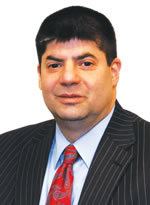Allegro
A Win for Artists
Musicians retain their right to workers' compensation
Volume 116, No. 2February, 2016

Harvey Mars, Esq.
Harvey Mars is counsel to Local 802. Legal questions from members are welcome. E-mail them to HsmLaborLaw@HarveyMarsAttorney.com. Harvey Mars’s previous articles in this series are archived at www.HarveyMarsAttorney.com. (Click on “Publications & Articles” from the top menu.) Nothing here or in previous articles should be construed as formal legal advice given in the context of an attorney-client relationship.
Workers’ Compensation laws exist in this country for two basic reasons. First, they provide a streamlined procedure for workers who are injured on the job to claim payment. Second, by placing limitations on the amount that workers can recover, the law protects and ensures the solvency of employers.
Employers are legally required to obtain workers’ comp insurance (as well as unemployment insurance) so that they are financially able to pay out claims if the need arises. It’s a neat system, but it’s only available to employees – not independent contractors. For many years, this excluded musicians and other performing artists. The only way artists could collect compensation for injuries was to engage in protracted legal proceedings at a substantial cost of time and money.
After a herculean effort that extended several years, the New York State workers’ compensation law was amended in 1986 so that professional musicians and other artists who worked for entertainment establishments and venues were now stipulated to be employees. This legislative reform was the initiative of a diverse array of proponents, including Local 802. I dug up some of the history and found that the AFL-CIO wrote at the time that the “entertainment industry in New York is unique and deserving of interest, support and, where necessary, legislative protection. For too long these workers were without union representation and the resulting benefits because they were classified as essentially independent contractors.”
Also at the time, Assemblyman Roger J. Robach noted that the vast majority of musicians and performers who are not in the “star” category must litigate the issue whether or not they are employees or independent contractors in order to receive the basic legal protections that are accorded to other employees.
Musicians’ entitlement to workers’ comp has remained unquestioned in New York State. However, last year, despite our best efforts to educate legislators as to its pernicious consequences, an amendment of the state workers’ comp law passed both the Assembly and Senate. This amendment would have permitted musicians and other performers to opt out of workers’ comp coverage. The impetus for a change in the law was the singular result of a certain performer who had been egregiously injured while on stage. As a result of these injuries, the performer was limited in her recovery only to a workers’ comp award, which arguably was less than what could have been recovered in a private lawsuit.
The amendment was slightly subtle and complex. Technically, it would have denied employment status to artists if they were executives of their own corporations and only if they opted out of workers’ comp coverage. Unions were given the legal right to veto the performer’s request.
On the surface, it would seem that this amendment would have only applied to artists who had formed their own corporations and were operating as a corporate entity. However, we think the law could have opened the door to huge consequences for Local 802 members and other musicians. It could have thrown us back to the pre-1986 legal landscape, where musicians and other performers were automatically considered to be independent contractors. While this consequence might have been unintended and not immediately obvious, it was real. Musicians could have lost employee status.
Some believed that this amendment wouldn’t have triggered these effects. This was simply not true. Under this proposed amendment, once musicians exercised their right not to be considered employees eligible for workers’ compensation, their choice would have been immutable and they would no longer be entitled to employee status. Once they returned to work after their injury had abated, the precedent would have been set, and their employer would have had legal justification in excluding them from employee status. And once they are designated as independent contractors, performers are not allowed to apply for unemployment benefits or workers’ comp and they are not allowed to unionize, due to the fact that independent contractors are excluded from coverage under the National Labor Relations Act.
Luckily, none of this came to pass. Last fall, Local 802 and other entertainment unions wrote to Gov. Cuomo to explain why we all opposed the bill. Maya Kremen and I met with the New York State Deputy Secretary for Labor and also the state’s legislative attorney. We explained in great detail why a change in the law should not happen.
I am very happy to report that our combined efforts paid off. Gov. Cuomo vetoed the law in late December. Our hard-fought legislative protections that we achieved 30 years ago remain intact, to the benefit of all performers in New York. A debt of gratitude is owed to Gov. Cuomo, who did not bow to political pressure on this issue.
